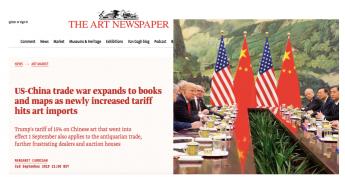Update on China tariffs - Art Newspaper / ILAB

The Art Newspaper, 3 September 2019, writes:
US-China trade war expands to books and maps as newly increased tariff hits art imports
Trump's tariff of 15% on Chinese art that went into effect 1 September also applies to the antiquarian trade, further frustrating dealers and auction houses
by MARGARET CARRIGAN
US and Chinese officials are struggling to schedule a meeting this month to continue their already fraught trade talks, but that did not stop a tariff on Chinese art and antiquities from going into effect on 1 September.
The Trump Administration hiked the import duty rate from 10% to 15% on 24 August, shortly before the US workforce absconded for the Labor Day holiday weekend. The news left many dealers and auction houses in the lurch, especially as New York’s autumn Asia Week sales kick off later this week.
Additionally, the revised tariff applies to the antiquarian trade and can be assessed on purchases of books, manuscripts, photographs, maps and other similar ephemera.
According to a statement released by the International League of Antiquarian Booksellers (ILAB) on 30 August, it is unclear how broad in scope the tariff application is to antiquarian goods at this juncture. Photography collections that include just one Chinese photo and any book—regardless of date or value that was published or printed in China, including modern firsts which were printed in China or early missionary imprints—all fall subject to the new 15% rate. Bibles, however, may potentially be exempt.
“It can be surprising and, in view of the tariffs, discouraging, to see just how many recent books were printed in China and are subject to these import duties,” says Stuart Bennett, ILAB’s general secretary, who adds that the organisation is monitoring the “complex” situation closely and will issue updates as more information on what falls under the tariff comes to light. “And of course, antiquarian dealers specialising in Asian materials are going to find trading with the United States much more complex, time-consuming and, inevitably, frustrating.”
